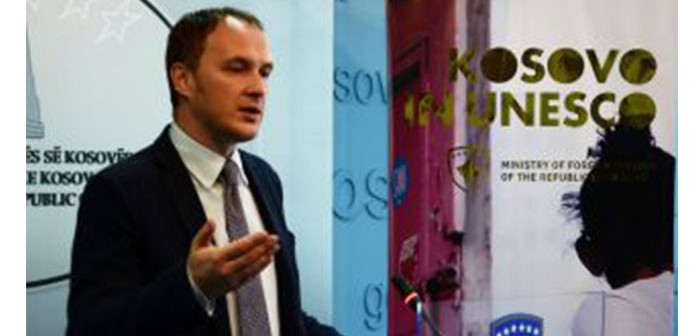After UNESCO decided to look at Kosovo’s membership application – a move that infuriated Serbian officials – experts said that obstacles remain on Pristina’s path to joining the UN’s cultural body.
Kosovo’s second bid to join UNESCO, the result of an official request last week from Albania for the former Serbian province’s admission to UNESCO, is expected to be strongly contested by Belgrade.
Tirana filed a request on Friday for the UNESCO Executive Council to put Kosovo on the agenda of its October session. The request was backed by 44 other UNESCO member states out of a total of 195.
Kosovo’s deputy foreign minister Petrit Selimi told media on Friday that UNESCO’s board will review Kosovo’s application for membership on October 3, while its general assembly is expected to vote on the issue in the first week of November.
But Serbian labour minister Aleksandar Vulin said on Saturday that Albania’s move “doesn’t lead to good neighbourly relations”, adding that Belgrade will do all it can to stop Kosovo’s UNESCO membership bid.
“I’m sorry that Albania did what it did… That doesn’t restore trust in the region and shows there are countries that don’t care or only care a little about what Serbia and Serbs feel,” Vulin said.
Belgrade opposes any recognition of Kosovo’s independence and argues that Pristina has failed to protect Serbian cultural and religious heritage since the war ended in 1999.
Serbian Foreign Minister Ivica Dacic admitted that the battle against Kosovo’s admission to UNESCO will be tough.
“We are ready for that fight. It is reasonable that we oppose such a decision being made,” Dacic said on Friday.
Albania’s request comes several months after Kosovo’s Prime Minister Hashim Thaci announced that Kosovo had applied to join UNESCO.
At the time, Dacic send a letter to UN Secretary-General Ban Ki-moon saying that Kosovo’s request was unacceptable under international law.
Kosovo’s membership bid was then rejected.
But Behlul Beqaj, a Kosovo political analyst, argued there was now a real chances for Kosovo to join the UN body, although he also said he expects Serbia’s government to try to block it.
“I assume they will complain about the way the membership bid was put forward, as it didn’t go through the United Nations but through the signatures of UNESCO member states,” Beqaj told BIRN.
Dusan Janjic from the Forum for Ethnic Relations, a Belgrade-based think tank, predicted that the biggest obstacle for Kosovo would be getting enough votes in its favour.
“Getting a majority [of the UNESCO member states]to vote for Kosovo’s membership would be hard because Kosovo doesn’t have full diplomatic relations with many of them,” Janjic told BIRN.
But he said he was pessimistic about Belgrade’s chances of blocking Pristina.
“Serbia is trying to lobby and to explain that joining UNESCO is one step further towards the international recognition of Kosovo. But I don’t believe they [Serbia] will be successful. Kosovo will enter UNESCO like it entered the International Olympic Committee [in 2014],” he said.
Many significant Serbian Orthodox monasteries and churches lie in Kosovo, and Belgrade officials have accused Pristina of not protecting them properly or even colluding in their destruction.
During ethnically-charged unrest across Kosovo in March 2004, 19 people were killed and more than 800 buildings were destroyed or damaged (including 29 churches or monasteries),according to an OSCE report.
International courts in Pristina have since convicted several people of destroying Serbian Orthodox churches, handing down jail sentences ranging from 21 months to 16 years.
But Milan Antonijevic from the Belgrade-based NGO Lawyers Committee for Human Rights said that the issue of Kosovo joining UNESCO was purely political.
“This is not about taking care of cultural heritage. This story is about politics and the questions of [Kosovo’s] statehood, as joining UNESCO would be a confirmation of statehood,” Antonijevic told BIRN.
He said he expects “high resistance” to Kosovo’s bid from countries that have not recognised Kosovo’s independence or have regularly supported Serbia, like Russia.
In order to become a UNESCO member, Kosovo first needs the support of its executive council. The council will then decide if UNESCO’s general conference will vote on Kosovo’s request during its session in November. Kosovo needs two-thirds of the vote to become a UNESCO member.
“Now the battle for votes will intensify, with both parties trying to gain the support of as many member states as possible,” said Gezim Krasniqi, a fellow in Albanian studies at University College London.
Krasniqi said Kosovo was well placed to get through the executive council stage but the general assembly would be a greater challenge.
But he said that because of Pristina’s support from major powers like the US and various European states, “Kosovo stand a very good chance to join UNESCO in November”.
Serbia has no right to veto Pristina’s UNESCO membership bid, and Kosovo is able to join even though it is not a UN member state.





